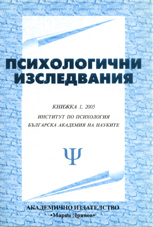СТАТУСИ И СТРУКТУРА НА НАЦИОНАЛНАТА ИДЕНТИЧНОСТ В ЮНОШЕСКА ВЪЗРАСТ
NATIONAL IDENTITY STATUSES AND STRUCTURE THROUGH ADOLESCENCE
Author(s): Krassimira Baytchinska, Savka SavovaSubject(s): Psychology
Published by: Институт за изследване на населението и човека - Българска академия на науките
Summary/Abstract: The purpose of this article is to present a research concerning national identity in adolescence. A short review of two basic trends in the research of national identity in the perspective of developmental psychology is presented. The research is based on the theoretical assumptions of psychosocial identity theory and its adherent the psychosocial identity status theory. We perceive national identity as a psychological structure which contains two dimensions: a degree of self-determination and activity of choice. We distinguish four statuses of national identity: achievement, foreclosure, diffusion, and moratorium. An attempt is made to explore the structure of every single identity status by its components: cognitive, affective, and behavioral. Our data is indicative of the fact that in all observed groups (by sex, age, educational program, town), the dominant status is moratorium, and the salience of diffusion is the lowest one. We resume that we observe a national identity moratorium among Bulgarian adolescents, which is developmentally and contextually defined. Differences in the status structure are also observed.
Journal: Психологични изследвания
- Issue Year: 08/2005
- Issue No: 1
- Page Range: 71-88
- Page Count: 18
- Language: Bulgarian

